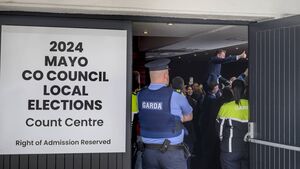Election race in Mayo is turned on its head

Mark Duffy celebrates after he was re-elected to Mayo County Council last June. Picture: Michael McLaughlin
News that Mark Duffy and Martina Jennings have been selected to stand for Fine Gael in the upcoming general election in Mayo has transformed the race for the five seats in this constituency.
We’ve previously written here about how safe the outgoing three TDs who are running again were. With the withdrawal of Michael Ring from politics, Dara Calleary, Rose Conway-Walsh and Alan Dillon looked in pole position to comfortably retain their seats with a battle royale for the final two seats.
Now all bets are off. The three outgoing TDs are still in a good position – no more than at county council level, an incumbent TD has the profile and has had the opportunity to show their worth. National politics might have more of an impact than local elections. For instance, dissatisfaction with the Government is far more likely to manifest in voting patterns at general elections than at local authority level.
Nonetheless, the three outgoing TDs have a good head start on everyone else.
The difference now is that they are going from a position where they looked to be a step ahead of all candidates in terms of vote-pulling power. Now, the field could well even out.
As of two weeks ago, we’ve written here about how the field was weaker when compared to all other elections since Mayo became a county-wide constituency in 1997. It is no slight on any individual candidate, just an across-the-board observation.
Something we often mentioned too is how our brightest and best do not seem willing to run for politics, which is a concern in the long run. This is the most open election in Mayo we can recall with at least two seats up for grabs – granted, all seats are up for grabs but the opportunity for aspiring politicians with only three outgoing TDs in a new five-seater is significant.
The entry into the race of Duffy and Jennings changes that argument considerably because, in this writer’s experience of observing them at close quarters, they are undoubtedly two very capable, ambitious and driven individuals. It is very encouraging more people of this ilk are willing to stand. But there are other questions to be asked.
There can be no doubt that both are running with a pragmatic outlook. With no deep connections to Fine Gael, it does appear to be a marriage of convenience.
We don’t know Martina Jennings’s politics but she certainly was not a member of Fine Gael before this. In her role as CEO of Mayo Roscommon Hospice, she had to be apolitical and develop relationships with politicians of all parties and none.
Mark Duffy’s position is more clear-cut. He was first elected to Mayo County Council in 2019 and reelected in 2024 as an Independent and has been a vocal critic of the Government in that time. There was talk, after meetings with Éamon Ryan in Ballina, that he might join the Green Party.
But Duffy knew that would be a political own goal in a county where the Greens were never that popular and much less so at the moment after their latest spell in Government. So he has hitched his wagon to Fine Gael in the hope this is the best vehicle for him to achieve his political ambitions.
Some might call it self-serving on both Jennings’ and Duffy’s behalf but I think pragmatic is a fairer description.
But that’s the thing – regardless of what you term it, if someone wants to be elected for reasons of personal ambition and/or motivation to make positive and meaningful changes to their county, the reality is that they most likely have to hitch themselves to either the Fine Gael or Fianna Fáil wagon. Voting patterns in Mayo won’t convince you otherwise.
Sinn Féin? Rose Conway-Walsh performed superbly in 2020 to take their first Dáil seat for Mayo in nearly a century. Despite a very strong team standing in this year’s local elections, they only won one seat, the outgoing one held by Gerry Murray in Swinford Electoral Area.
Independent? Jerry Cowley was elected in 2002 but lost his seat with less than half of his ‘02 vote in 2007. Beverley Flynn finished her Dáil career as an Independent but she was the very definition of a Fianna Fáil gene pool candidate.
They are the only three non-FF/FG candidates elected to the Dáil in Mayo since 1997. A total of 27 TDs were declared elected in that time, 16 of them for Fine Gael and eight for Fianna Fáil (obviously this includes people elected more than once).
Other parties? Paul Lawless has been elected to Mayo County Council for Aontúa and Chris Maxwell for Independent Ireland. Labour’s vote in Mayo was often a personal vote for Johnny Mee. The Greens, People Before Profit and the Social Democrats have never had anyone elected in the county, nor did the long-defunct Progressive Democrats.
The counterpoint is that the candidate needs to be strong. If Duffy and Jennings did not decide to run, Fine Gael would be going with a two-candidate strategy. Now, because they’ve added two very strong candidates, they have gone from being realistically only on course for one seat to now being in with a very good shout of taking three seats.
So the profile and calibre of the candidate matters but to get elected and, if so, to be in a position to influence policy, the two Civil War parties are a crutch still required.
It also begs questions for both Fine Gael and Fianna Fáil at grassroots about their relative inability to harness and develop young, capable, ambitious candidates that they can run in such elections. We’ve moved to an era of parachute candidates where profile and experience is often gained elsewhere before the parties swoop in and try to harness that.
And for all other parties, this latest news is another sobering reminder of how far behind the curve they remain.





